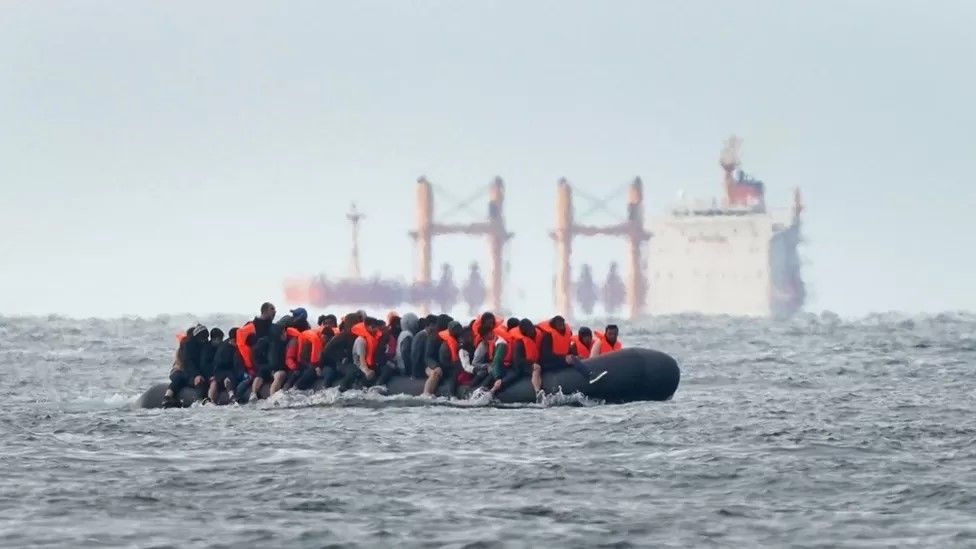New Rwanda bill gives ministers power to disregard some human rights law
- Published

A draft law, which aims to enable the government's flagship Rwanda policy to go ahead, gives ministers the power to disregard some human rights law.
The government said the bill, which will be introduced in Parliament on Thursday, made clear in UK law Rwanda was a safe country for asylum seekers.
But it does not go as far as some Conservative MPs on the right of the party had called for.
The legislation aims to address the concerns of the Supreme Court.
Last month, the UK's highest court ruled that the plans to send some asylum seekers to Rwanda were unlawful.
The policy, which was first announced by then-Prime Minister Boris Johnson in April 2022, aims to deter people from crossing the English Channel in small boats.
But it has been repeatedly delayed by legal challenges and no asylum seekers have been sent to Rwanda from the UK so far.
The bill, which must be voted on by Parliament, orders the courts to ignore key sections of the Human Rights Act in an attempt to sidestep the Supreme Court's existing judgment.
It also orders the courts to ignore other British laws or international rules - such as the international Refugee Convention - that stand in the way of deportations to Rwanda.
However, it does not go as far as some Tory MPs wanted.
Former Home Secretary Suella Braverman and her supporters had called for it to override the entire Human Rights Act, the European Convention on Human Rights (ECHR), the Refugee Convention, and all other international law.
'Fatally flawed'
The bill allows ministers to ignore any emergency order from the European Court of Human Rights in Strasbourg to temporarily halt a flight to Rwanda while an individual case is still being considered.
But it stops short of disapplying the whole of the ECHR.
It also allows migrants to legally challenge their removal to Rwanda on specific individual grounds, if they can prove that being put on a plane would leave them at real risk of serious harm.
A source close to Mrs Braverman said the bill was "fatally flawed" and would be "bogged down in the courts for months and months".
"The prime minister has kept the ability for every single illegal migrant to make individual human rights claims against their removal and to then appeal those claims if they don't succeed at first," the source said.
"It is a further betrayal of Tory voters and the decent patriotic majority who want to see this insanity brought to an end."
The government said the bill would "end the merry-go-round of legal challenges" preventing asylum seekers being removed to Rwanda.
However, the draft legislation concedes that it may not be compatible with minimum human rights safeguards.
Legislation rarely goes before MPs with such a legal warning.
It means lawyers have told ministers the measures could still be legally challenged - and the Supreme Court could find them incompatible with human rights obligations and therefore unworkable.
Rwanda's foreign affairs minister Vincent Biruta said the country would not be able to continue with the scheme "without lawful behaviour by the UK".
He said: "It has always been important to both Rwanda and the UK that our rule of law partnership meets the highest standards of international law, and it places obligations on both the UK and Rwanda to act lawfully."
Prime Minister Rishi Sunak said: "Through this new landmark emergency legislation, we will control our borders, deter people taking perilous journeys across the Channel and end the continuous legal challenges filling our courts."
Home Secretary James Cleverly signed a new treaty with Rwanda on Tuesday.
The government hopes the treaty, combined with the new bill, will be enough to allow the Rwanda scheme to go ahead.
Labour has pledged to scrap the policy if it wins the next election.
Shadow home secretary Yvette Cooper said the government and the Conservative Party were in "total chaos".
"They've got open warfare among their backbenches, the starting gun fired on the next leadership election and once again the whole country paying the price for this chaos," she told the Commons.
Related Topics
- Published6 December 2023
- Published6 December 2023
- Published4 days ago